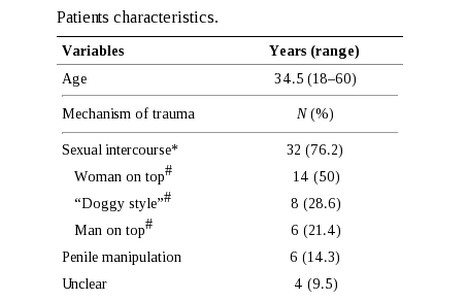En güvenli ve tehlikeli seks pozisyonları açıklandı: Kadının üstte olması riskli!
 En tehlikeli ve en güvenli seks pozisyonları ile ilgili 13 yılı kapsayan bilimsel bir araştırmanın sonuçları açıklandı. Uroloji uzmanlarının saygın bilim dergisi Advances in Urology’de yayımlanan Brezilya merkezli çalışmanın sonuçlarına göre, sevişme esnasında kadının üstte olması riskli durumlar yaratıyor ve penis fraktürü (penis kırılması) gibi yaralanmalara neden olabiliyor. Çalışmanın yazarları penis fraktürü gibi yaralanmaların %50’sinin kadınların üstte olduğu pozisyonlarda yine %29’unun kadının elleri ve ayakları üzerinde olduğu pozisyonda yaşandığına işaret ederek erkeğin üstte olduğu pozisyonda bu oranın %21’e gerilediğini saptadılar.
En tehlikeli ve en güvenli seks pozisyonları ile ilgili 13 yılı kapsayan bilimsel bir araştırmanın sonuçları açıklandı. Uroloji uzmanlarının saygın bilim dergisi Advances in Urology’de yayımlanan Brezilya merkezli çalışmanın sonuçlarına göre, sevişme esnasında kadının üstte olması riskli durumlar yaratıyor ve penis fraktürü (penis kırılması) gibi yaralanmalara neden olabiliyor. Çalışmanın yazarları penis fraktürü gibi yaralanmaların %50’sinin kadınların üstte olduğu pozisyonlarda yine %29’unun kadının elleri ve ayakları üzerinde olduğu pozisyonda yaşandığına işaret ederek erkeğin üstte olduğu pozisyonda bu oranın %21’e gerilediğini saptadılar.
Makalenin yazarları yürüttükleri 13 yıl süren çalışmada, hastanelere penis kırılması şikayetiyle gelen hastaları inceleyerek en güvenli ve yaralanmalarla sonuçlanabilen en tehlikeli sevişme poziyonlarını araştırdı. Çalışmadan elde edilen sonuçlara göre, cinsel birleşme bicimleri arasında en güvenli seks pozisyonu erkeğin üstte olması durumu iken en tehlikeli sevişme yöntemi ise kadının üstte olduğu pozisyon.
 Araştırmacılar, seks esnasında yaşanan penis kırılma vakalarının çoğunun kadının üstte olduğu pozisyonlarda meydana geldiğini belirtirken bunun en önemli nedeni olarak şöyle bir gerekçe belirttiler: “Kadının üstte olduğu pozisyonlarda vücut ağırlığının tamamı penisin üzerinde oluyor ve kadın, “yanlış penetrasyonda” ilişkiyi kesemeyebiliyor. Bu durumda penis zarar görürken, erkek üstteyken penetrasyonu daha kolay kontrol edebiliyor ve ters bir durumda ilişkiyi çok hızlı durdurabiliyor.”
Araştırmacılar, seks esnasında yaşanan penis kırılma vakalarının çoğunun kadının üstte olduğu pozisyonlarda meydana geldiğini belirtirken bunun en önemli nedeni olarak şöyle bir gerekçe belirttiler: “Kadının üstte olduğu pozisyonlarda vücut ağırlığının tamamı penisin üzerinde oluyor ve kadın, “yanlış penetrasyonda” ilişkiyi kesemeyebiliyor. Bu durumda penis zarar görürken, erkek üstteyken penetrasyonu daha kolay kontrol edebiliyor ve ters bir durumda ilişkiyi çok hızlı durdurabiliyor.”
Kaynak: Mechanisms Predisposing Penile Fracture and Long-Term Outcomes on Erectile and Voiding Functions. L. Reis, M. Cartapatti, R. Marmiroli, R. Destro S. and Aç Fregonesi. Adv Urol. 2014; 2014: 768158. Apr 13, 2014. doi:10.1155/2014/768158
Makalenin tam metnine aşağıdaki linkten ulaşılabilmektedir:
http://www.ncbi.nlm.nih.gov/pmc/articles/PMC4005103/
Abstract
Purpose: To determine the mechanisms predisposing penile fracture as well as the rate of long-term penile deformity and erectile and voiding functions.
Methods: All fractures were repaired on an emergency basis via subcoronal incision and absorbable suture with simultaneous repair of eventual urethral lesion. Patients’ status before fracture and voiding and erectile functions at long term were assessed by periodic follow-up and phone call. Detailed history included cause, symptoms, and single-question self-report of erectile and voiding functions.
Results: Among the 44 suspicious cases, 42 (95.4%) were confirmed, mean age was 34.5 years (range: 18–60), mean follow-up 59.3 months (range 9–155). Half presented the classical triad of audible crack, detumescence, and pain. Heterosexual intercourse was the most common cause (28 patients, 66.7%), followed by penile manipulation (6 patients, 14.3%), and homosexual intercourse (4 patients, 9.5%). “Woman on top” was the most common heterosexual position (n=14, 50%), followed by “doggy style” (n = 8, 28.6%). Four patients (9.5%) maintained the cause unclear. Six (14.3%) patients had urethral injury and two (4.8%) had erectile dysfunction, treated by penile prosthesis and PDE-5i. No patient showed urethral fistula, voiding deterioration, penile nodule/curve or pain.
Conclusions: “Woman on top” was the potentially riskiest sexual position (50%). Immediate surgical treatment warrants long-term very low morbidity.
 Patients characteristics.
Patients characteristics.
Regarding sexual position reported by man in heterosexual relationship (n = 28), “woman on top” was the most common situation associated, corresponding with 14 cases (50%), followed by “doggy style” in 8 cases (28.6%). Six patients (21.4%) reported being on top at the moment of injury. Twenty-six (92.9%) patients reported vaginal penetration, and only 2 (7%) confirmed anal penetration.
Regarding homosexual intercourses, half of the patients (n = 2) reported being on top and the other half (n = 2) had his partner on “doggy style” position. Overall, sixteen patients (36.4%) had preoperative ultrasound, with a positive predictive value of 87.5%. The two cases of mismatch between the ultrasound image and intraoperative findings had a lesion smaller than 2 mm reported by the radiologist, which were not confirmed by surgery.
Four (9.5%) tunica albuginea tears were bilateral with an overall mean size of 1.6 cm and six (14.3%) patients had urethral injury diagnosed intraoperatively, with 5 being previously confirmed with retrograde urethrogram due to urethral bleeding. There was no correlation between injury extension and mechanism (sexual position, etc.).
YAZIYI PAYLAŞ


 En tehlikeli ve en güvenli seks pozisyonları ile ilgili 13 yılı kapsayan bilimsel bir araştırmanın sonuçları açıklandı. Uroloji uzmanlarının saygın bilim dergisi Advances in Urology’de yayımlanan Brezilya merkezli çalışmanın sonuçlarına göre, sevişme esnasında kadının üstte olması riskli durumlar yaratıyor ve penis fraktürü (penis kırılması) gibi yaralanmalara neden olabiliyor. Çalışmanın yazarları penis fraktürü gibi yaralanmaların %50’sinin kadınların üstte olduğu pozisyonlarda yine %29’unun kadının elleri ve ayakları üzerinde olduğu pozisyonda yaşandığına işaret ederek erkeğin üstte olduğu pozisyonda bu oranın %21’e gerilediğini saptadılar.
En tehlikeli ve en güvenli seks pozisyonları ile ilgili 13 yılı kapsayan bilimsel bir araştırmanın sonuçları açıklandı. Uroloji uzmanlarının saygın bilim dergisi Advances in Urology’de yayımlanan Brezilya merkezli çalışmanın sonuçlarına göre, sevişme esnasında kadının üstte olması riskli durumlar yaratıyor ve penis fraktürü (penis kırılması) gibi yaralanmalara neden olabiliyor. Çalışmanın yazarları penis fraktürü gibi yaralanmaların %50’sinin kadınların üstte olduğu pozisyonlarda yine %29’unun kadının elleri ve ayakları üzerinde olduğu pozisyonda yaşandığına işaret ederek erkeğin üstte olduğu pozisyonda bu oranın %21’e gerilediğini saptadılar. Kansızlık kadınlarda libidoyu düşürebilir ve cinsel isteksizlik yaratabilir!
Kansızlık kadınlarda libidoyu düşürebilir ve cinsel isteksizlik yaratabilir! MRI’da konuşma, yutkunma, öpüşme ve seks nasıl gözükür?
MRI’da konuşma, yutkunma, öpüşme ve seks nasıl gözükür? Bel ağrısı ve seks: Hangi pozisyon daha güvenli?
Bel ağrısı ve seks: Hangi pozisyon daha güvenli? Erektil Disfonksiyon (sertleşme bozukluğu) için yeni bir tedavi: AMS-LGX
Erektil Disfonksiyon (sertleşme bozukluğu) için yeni bir tedavi: AMS-LGX Erektil disfonksiyon nedir? Sertleşme sorunu belirtileri ve tedavisi
Erektil disfonksiyon nedir? Sertleşme sorunu belirtileri ve tedavisi
YORUMUNUZ VAR MI?